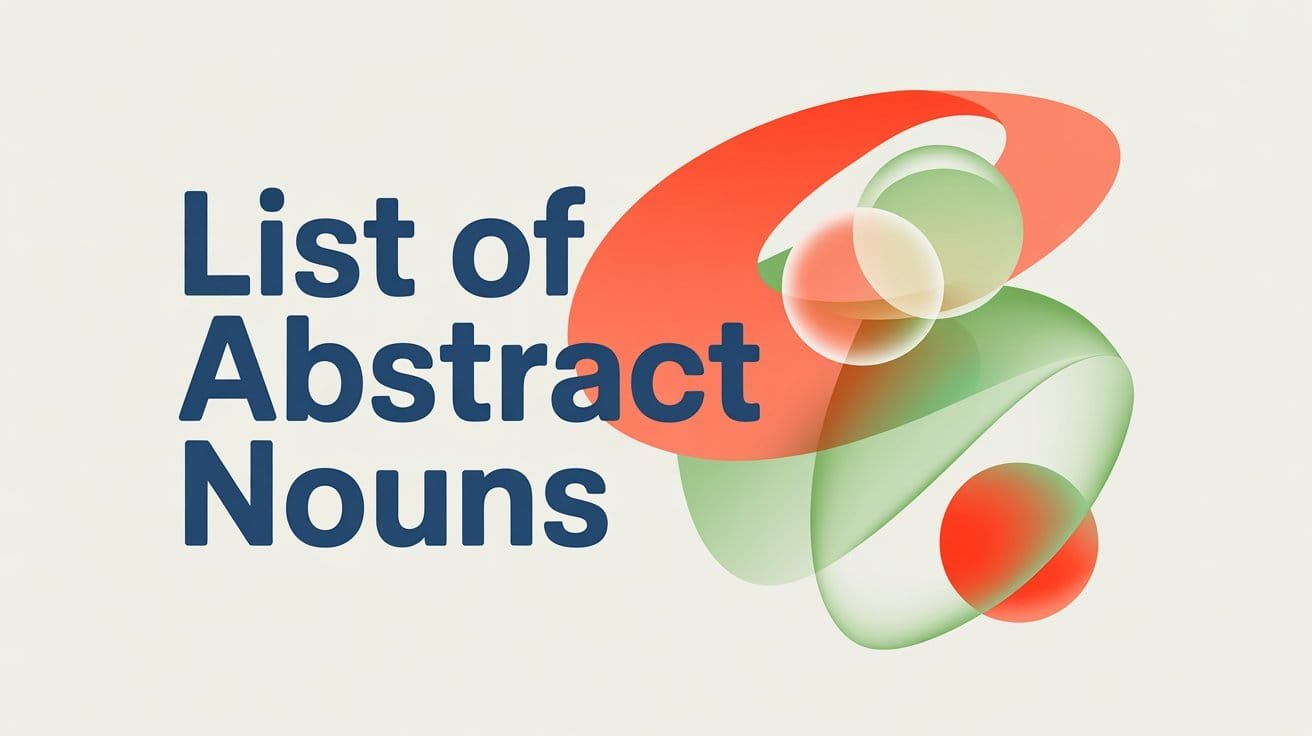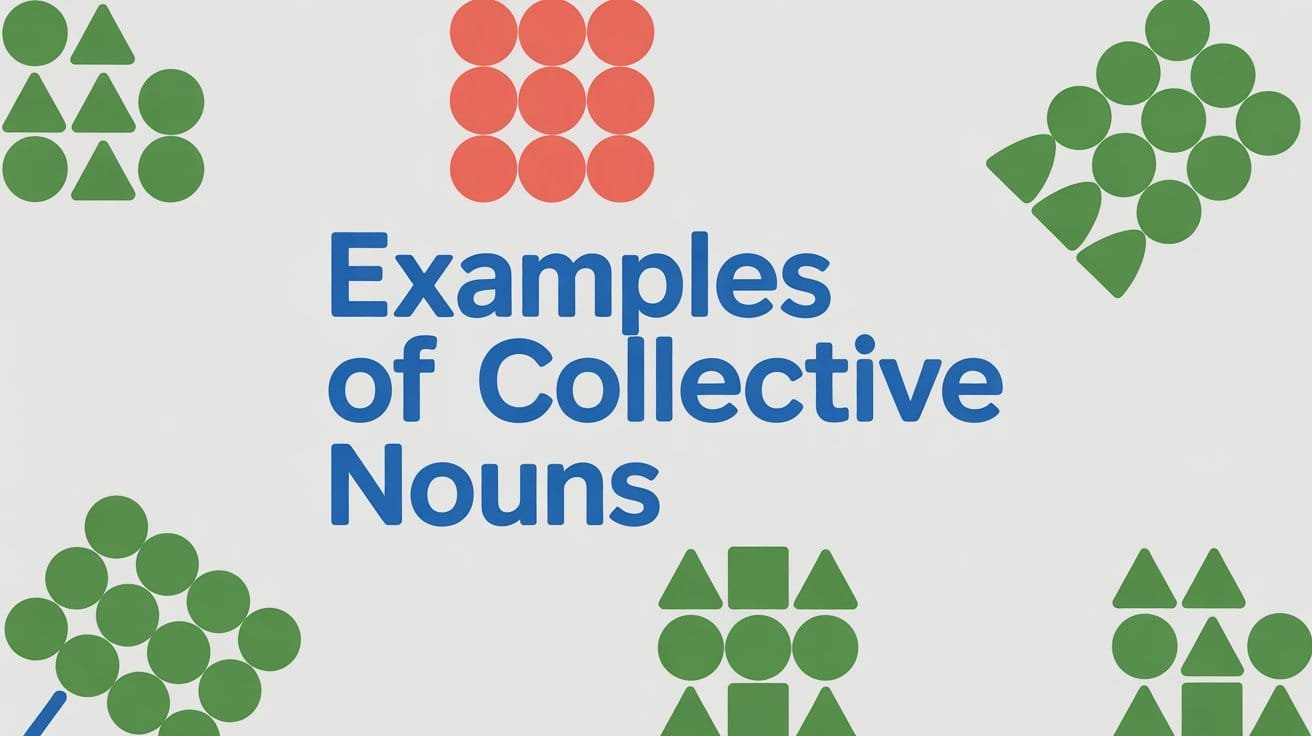Abstract nouns are the special words that help us describe thoughts, emotions, and qualities that aren’t physical. These nouns describe intangible things such as freedom, happiness, or courage.
In this post, you’ll find the abstract noun list with over 150 common abstract nouns, grouped by category and listed A to Z. This collection is perfect for grammar practice, vocabulary building, or improving your writing.
Abstract Noun Examples by Category
Abstract nouns can describe a wide range of ideas and experiences. Below are some common examples, grouped into helpful categories to show how they express different types of meaning.
Abstract Nouns that Show Emotions
These nouns describe feelings and emotional states.
- anger
- fear
- happiness
- love
- sadness
- anxiety
- joy
- pride
- grief
- excitement
Abstract Nouns that Refer to States and Conditions
These refer to situations, periods, or states of being.
- childhood
- peace
- sleep
- silence
- chaos
- friendship
- health
- poverty
- death
- boredom
Abstract Nouns that Describe Qualities and Characteristics
These describe traits, standards, or personal strengths.
- honesty
- kindness
- courage
- bravery
- intelligence
- loyalty
- strength
- wisdom
- beauty
- patience
Abstract Nouns that Refer to Ideas and Concepts
These refer to broad themes, principles, or mental constructs.
- freedom
- justice
- truth
- democracy
- knowledge
- education
- time
- culture
- success
- responsibility
150+ Common Abstract Nouns (A–Z List)
Below is a curated list of 150+ abstract nouns, organized alphabetically for easy reference.
Abstract Noun List (A–E)
- ability
- absence
- achievement
- admiration
- adventure
- ambition
- anger
- anxiety
- beauty
- belief
- bravery
- chaos
- childhood
- comfort
- communication
- compassion
- confidence
- confusion
- courage
- curiosity
- danger
- death
- democracy
- determination
- disappointment
- education
- effort
- energy
- enjoyment
- envy
- equality
- excitement
- experience
- expression
Abstract Noun List (F–J)
- failure
- faith
- fame
- fear
- feeling
- freedom
- friendship
- fun
- generosity
- gentleness
- goal
- goodness
- growth
- guilt
- happiness
- harm
- hate
- health
- help
- honesty
- hope
- hospitality
- humor
- hunger
- idea
- identity
- imagination
- importance
- independence
- influence
- information
- inspiration
- intelligence
- interest
- joy
- justice
Abstract Noun List (K–O)
- kindness
- knowledge
- laughter
- law
- liberty
- life
- love
- loyalty
- luck
- maturity
- memory
- mercy
- mind
- motivation
- movement
- need
- obedience
- opinion
- opportunity
- organization
- outcome
- ownership
Abstract Noun List (P–T)
- pain
- passion
- patience
- peace
- perfection
- performance
- pleasure
- poverty
- power
- pride
- progress
- quality
- reality
- reason
- recognition
- relationship
- reliability
- respect
- responsibility
- safety
- satisfaction
- service
- shame
- silence
- skill
- strength
- success
- support
- surprise
- talent
- teamwork
- thought
- time
- tolerance
- trust
- truth
Abstract Noun List (U–Z)
- understanding
- unity
- value
- victory
- violence
- virtue
- vision
- wealth
- weakness
- willingness
- wisdom
- wonder
- worth
- youth
- zeal
Example Sentences with Abstract Nouns
These sentences show how abstract nouns are used in everyday English. Each example includes one abstract noun in context to help you see how these ideas function within a sentence.
- Her compassion for animals inspired the entire class.
- Without discipline, it’s hard to reach long-term goals.
- The children’s laughter echoed through the hall.
- He was rewarded for his bravery during the rescue.
- They handled the situation with remarkable maturity.
- Creativity is essential in solving complex problems.
- She was overwhelmed by a sense of loss after the storm.
- The speech stirred a feeling of hope in the audience.
- Time seemed to move slower in the countryside.
- He gained confidence after completing the training.
- Jealousy can damage even the strongest relationships.
- The team celebrated their victory with pride.
- Despite criticism, she remained focused on her mission.
- Honesty is something her parents always taught her.
- They admired his dedication to his work.
- Justice must be fair, not just legal.
- We all seek happiness in different ways.
- Her wisdom guided the family through hard times.
- There was a moment of complete silence before the applause.
- The group’s unity made the project a success.
FAQs
What is an abstract noun?
An abstract noun names something that can’t be seen or touched—such as an idea, feeling, quality, or state. Examples include hope, knowledge, and freedom.
Can abstract nouns be plural?
Yes, many abstract nouns can be pluralized depending on the context.
Examples:
They shared their hopes and fears.
Different beliefs shaped their decisions.
However, some abstract nouns like furniture or advice are uncountable and typically stay singular.
Is time an abstract noun?
Yes. Time is considered an abstract noun because it refers to a concept you can measure but not physically touch or see.
What’s the difference between abstract and concrete nouns?
An abstract noun refers to intangible things like love or honesty. A concrete noun refers to physical objects like book or chair—things you can see or touch.



